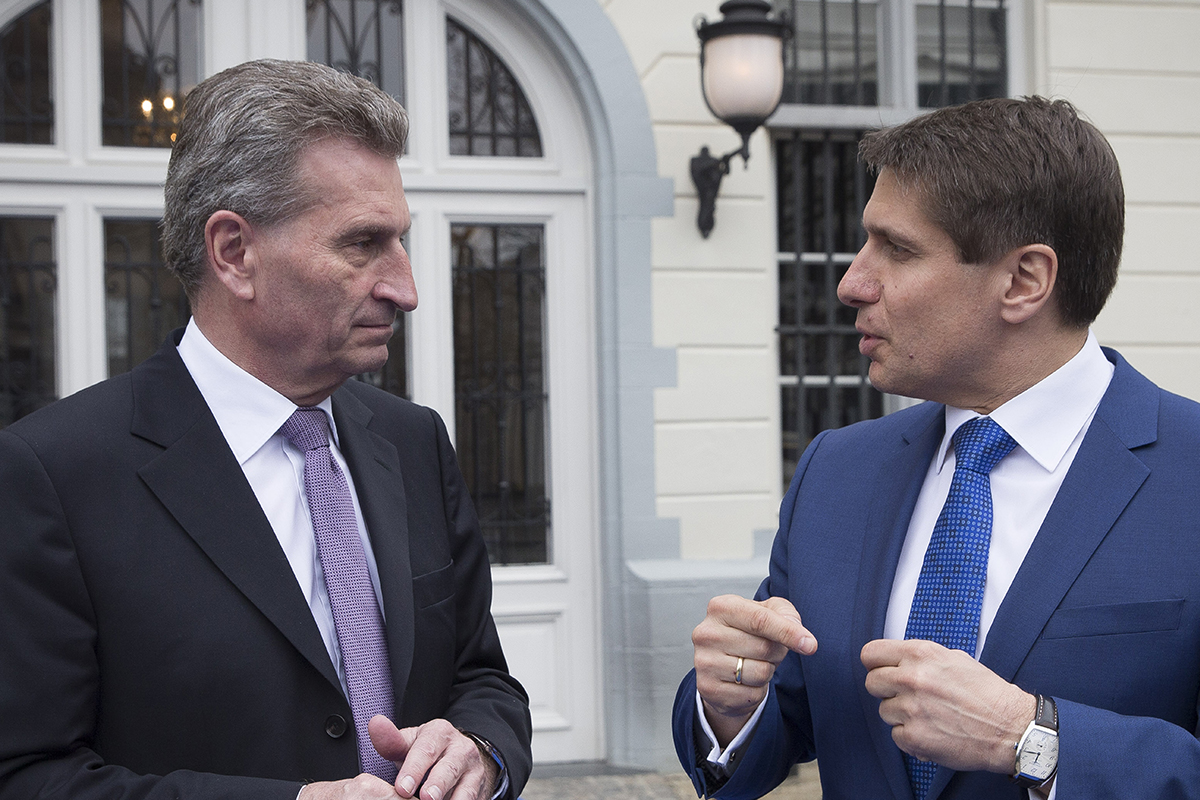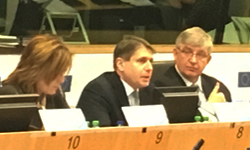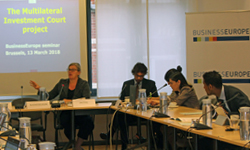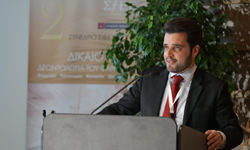BusinessEurope Headlines No. 2018-10
Swift agreement of EU budget framework post-2020 needed

“Business is very concerned about delays in agreeing the Multiannual Financial Framework (MFF) post-2020. A last-minute deal after the European elections will have serious economic consequences as it would likely mean significant delays in the start of programmes in 2021, and a lost year in investment by the EU budget.” This was the key message of BusinessEurope Director General Markus J. Beyrer in a meeting with European Commissioner for Budget & Human Resources Günther Oettinger on 14 March 2018. Beyrer also stressed the need to substantially increase the EU budget on research and innovation. “EU research and innovation policy is clearly underfinanced. An additional €150 billion a year would have to be invested to reach the EU’s own 3% 2020 target”, he said. For more detailed information, please find here a link to BusinessEurope’s recent position on MFF.
![]() Contact: Frederik Lange
Contact: Frederik Lange
Our comment
Services Package - businesses need a positive signal, now
By Martynas Barysas, Director for Internal Market

In the light of the study “The Cost of Non-Europe in the Single Market”, published by the European Parliamentary Research Service, the adoption of the Services Package by the European Commission in 2017 may be a small yet important element in steps towards potential gains estimated for the services sector between 337.7 and 636.7 billion euros. The full and correct implementation of the Services Directive alone (and the Services Package largely focuses on this) could yield additional annual benefits between 100-304 billion euros. In our position paper we’ve welcomed this timely publication of the Services Package by the Commission.
This spring marks one year of negotiations on this package and the 25th anniversary of the Single Market. This is a crucial moment, with half of the Services Package (Services E-card) struggling its way through a challenging quality scrutiny by both co-legislators, while the other half (Notifications in Services and Proportionality Test before Regulating a Profession) sees a bumpy road at the trilogues between the EU institutions.
Businesses need a positive signal, now. The presently negotiated Services Package is about enforcement of the present rules, transparency among Member States and society at large, as well as prevention of additional costs for both businesses and consumers.
BusinessEurope understands the complexity of the tasks of removing barriers which are very diverse, ranging from bad application and enforcement of existing EU legislation to fragmentation between 28 national rules or overlaps and inconsistencies. There are legitimate questions raised with regard to the most appropriate way to address those barriers. We therefore call to focus on preventive measures addressing potential new regulatory barriers in the services sector. We strongly encourage to deliver on the foreseen trilogues and adopt at least the Notifications in Services and Proportionality Test before Regulating a Profession proposals still before the summer break.
Looking ahead, BusinessEurope also invites the Commission for a dialogue with business on a comprehensive fact-finding exercise to identify and assess the remaining regulatory barriers to the Single Market in services, focusing on those areas were the highest growth potential is expected, such as business services. This assessment could lay the ground for future work on the Single Market for services, including evidence-based and targeted further harmonization, or mutual recognition schemes.
BusinessEurope calls for a concrete “European agenda for services" to the benefit of the EU as a whole.
Contact: Martynas Barysas
Japanese Association of Corporate Executives discusses Brexit with BusinessEurope
 Keizai Doyukai, the Japanese Association of Corporate Executives, met with Director General Markus J. Beyrer to discuss BusinessEurope’s views on Brexit. Beyrer underlined that the main priority for BusinessEurope is to preserve the integrity of the Single Market, which should also be a guiding principle for a future agreement. “Next steps should include that the withdrawal agreement is transformed into a legal text, that a ‘status quo-like’ transition is ensured, and that the future economic relationship between the EU and the UK remains as close as possible”, he said. The ongoing uncertainty surrounding the Brexit negotiations continues to raise concerns among both European and Japanese businesses. Around 1000 Japanese companies have established subsidiaries in the United Kingdom. The European Council in March 2018 should therefore aim to provide as much clarity as possible on transition so that businesses are able to prepare for the future.
Keizai Doyukai, the Japanese Association of Corporate Executives, met with Director General Markus J. Beyrer to discuss BusinessEurope’s views on Brexit. Beyrer underlined that the main priority for BusinessEurope is to preserve the integrity of the Single Market, which should also be a guiding principle for a future agreement. “Next steps should include that the withdrawal agreement is transformed into a legal text, that a ‘status quo-like’ transition is ensured, and that the future economic relationship between the EU and the UK remains as close as possible”, he said. The ongoing uncertainty surrounding the Brexit negotiations continues to raise concerns among both European and Japanese businesses. Around 1000 Japanese companies have established subsidiaries in the United Kingdom. The European Council in March 2018 should therefore aim to provide as much clarity as possible on transition so that businesses are able to prepare for the future.
Contact: Maurice Fermont
DG Beyrer presents BusinessEurope priorities to the EESC Employers’ Group
 Director General Markus J. Beyrer was invited to present on 14 March 2018 BusinessEurope’s priorities for the next months to the group of employers in the European Economic and Social Committee (EESC). He underlined the importance to undertake the necessary reforms to ensure sustainable growth in Europe in order to remain competitive on a global level. More specifically, he stated, we need to pursue an ambitious trade agenda with our international partners with the aim to put Europe in the centre of a global trade network, use the current supportive momentum to make progress on the preparations for an Industrial Strategy for Europe, and continue the work on the Single Market.
Director General Markus J. Beyrer was invited to present on 14 March 2018 BusinessEurope’s priorities for the next months to the group of employers in the European Economic and Social Committee (EESC). He underlined the importance to undertake the necessary reforms to ensure sustainable growth in Europe in order to remain competitive on a global level. More specifically, he stated, we need to pursue an ambitious trade agenda with our international partners with the aim to put Europe in the centre of a global trade network, use the current supportive momentum to make progress on the preparations for an Industrial Strategy for Europe, and continue the work on the Single Market.
Contact: Jasmin Ploner
How the EU post 2020 Multiannual Financial Framework should support SME development
 A consortium of five national promotional banks (BPI, ICO, CDP, KfW and BBB) presented on 7 March 2018 a report on how to promote small and medium-sized enterprises (SMEs) internationalisation, in a conference with the participation of Irmfried Schwimann, Deputy Director General of the European Commission Directorate General Internal Market, Industry, Entrepreneurship and SMEs (DG GROW). Daniel Cloquet, BusinessEurope’s Director for SMEs and Entrepreneurship, underlined that innovative SMEs tend to be more active in international trade than other SMEs, and vice-versa. In the context of the EU post-2020 Multiannual Financial Framework (MFF), EU SME-geared actions will need to be deployed in the areas or research and development and innovation, as is the case with the EU Framework Programme for Research and Innovation, Horizon 2020. SME-geared actions should also be integrated in other EU flagship initiatives. But such a mainstreaming approach will not be sufficient to support SME development. Cloquet explained that the post-2020 MFF should also contain a specific EU programme dedicated to the promotion of the competitiveness of SMEs, like in the current COSME programme (the EU programme for the competitiveness of SMEs).
A consortium of five national promotional banks (BPI, ICO, CDP, KfW and BBB) presented on 7 March 2018 a report on how to promote small and medium-sized enterprises (SMEs) internationalisation, in a conference with the participation of Irmfried Schwimann, Deputy Director General of the European Commission Directorate General Internal Market, Industry, Entrepreneurship and SMEs (DG GROW). Daniel Cloquet, BusinessEurope’s Director for SMEs and Entrepreneurship, underlined that innovative SMEs tend to be more active in international trade than other SMEs, and vice-versa. In the context of the EU post-2020 Multiannual Financial Framework (MFF), EU SME-geared actions will need to be deployed in the areas or research and development and innovation, as is the case with the EU Framework Programme for Research and Innovation, Horizon 2020. SME-geared actions should also be integrated in other EU flagship initiatives. But such a mainstreaming approach will not be sufficient to support SME development. Cloquet explained that the post-2020 MFF should also contain a specific EU programme dedicated to the promotion of the competitiveness of SMEs, like in the current COSME programme (the EU programme for the competitiveness of SMEs).
![]() Contact: Daniel Cloquet
Contact: Daniel Cloquet
Stepping up European Social Fund’s support to capacity building of social partners
 “Capacity building of social partners is part of the actions that the European Social Fund (ESF) can finance. However, it is a fact that social partners’ needs in a number of countries are currently not met. Solutions are needed to improve ESF support to social partners in the next programming period”. This was the key message by Social Affairs Director Maxime Cerutti during the final project conference of the European social partners - BusinessEurope, the European Trade Union Confederation (ETUC), the European Centre of Employers and Enterprises providing Public Services and Services of general interest (CEEP), and the European Association of Craft, Small and Medium-sized Enterprises (UEAPME) - on ‘The Role of ESF in Capacity Building of Social Partners’ on 9 March 2018 in Brussels. The European social partners discussed the key findings of their research on this issue and key recommendations to the European Commission and the EU Member States. The European Commission and ESF Managing Authorities should ensure in the future the availability of sufficient resources for social partners capacity building. This includes the objective to improve social partners’ involvement in the European semester process to progress towards a reform partnership.
“Capacity building of social partners is part of the actions that the European Social Fund (ESF) can finance. However, it is a fact that social partners’ needs in a number of countries are currently not met. Solutions are needed to improve ESF support to social partners in the next programming period”. This was the key message by Social Affairs Director Maxime Cerutti during the final project conference of the European social partners - BusinessEurope, the European Trade Union Confederation (ETUC), the European Centre of Employers and Enterprises providing Public Services and Services of general interest (CEEP), and the European Association of Craft, Small and Medium-sized Enterprises (UEAPME) - on ‘The Role of ESF in Capacity Building of Social Partners’ on 9 March 2018 in Brussels. The European social partners discussed the key findings of their research on this issue and key recommendations to the European Commission and the EU Member States. The European Commission and ESF Managing Authorities should ensure in the future the availability of sufficient resources for social partners capacity building. This includes the objective to improve social partners’ involvement in the European semester process to progress towards a reform partnership.
Contact: Guillaume Cravero
2018 JADE Awards: BusinessEurope takes part in the jury
 The European Confederation of Junior Enterprises (JADE) organised its annual contest for the JADE Excellence Awards on 8 March 2018 in Brussels. Daniel Cloquet, BusinessEurope’s Director for SMEs and Enterpreneurship, was part of the jury. The Swiss Junior Enterprise EPFL was named “Junior Enterprise of the Year”. Five other thematic awards were granted. JADE’s President, Diogo Parreira, who opened the ceremony, highlighted the contribution that the JADE Junior Enterprises want to make to the United Nations Millennium Goals. BusinessEurope cooperates with JADE since 2008, recognising the value of the Junior Enterprise concept, which we consider to be an excellent tool to develop entrepreneurial skills.
The European Confederation of Junior Enterprises (JADE) organised its annual contest for the JADE Excellence Awards on 8 March 2018 in Brussels. Daniel Cloquet, BusinessEurope’s Director for SMEs and Enterpreneurship, was part of the jury. The Swiss Junior Enterprise EPFL was named “Junior Enterprise of the Year”. Five other thematic awards were granted. JADE’s President, Diogo Parreira, who opened the ceremony, highlighted the contribution that the JADE Junior Enterprises want to make to the United Nations Millennium Goals. BusinessEurope cooperates with JADE since 2008, recognising the value of the Junior Enterprise concept, which we consider to be an excellent tool to develop entrepreneurial skills.
Contact: Daniel Cloquet
Discussing the Multilateral Investment Court project
 BusinessEurope gathered experts from a broad array of institutions – the European Commission, the United Nations Commission on International Trade Law (UNCITRAL), the World Bank and the World Trade Organisation (WTO) – to discuss a Multilateral Investment Court on 13 March 2018. Participants were informed about the current discussions in the context of the EU as well as multilaterally and could exchange views on best practices and experiences. Proposed by the European Commission as a means to effectively reform and modernise investor-to-state dispute resolution, the Multilateral Investment Court should be comprised of a First Instance Tribunal and an Appeal Tribunal, which would be able to adjudicated on investor-to-state disputes on the grounds of treaties that have been placed under its jurisdiction. Based on the draft negotiating directives on the establishment of a Multilateral Investment Court that were published in September 2017 by the European Commission, the discussion focused on structural aspects of the Court, such as whether it will be a stand-alone institution or docked into an existing one, as well as functioning aspects of the Court, including the appointment of judges, the jurisdiction of the Court and the prospects of an Appeal Tribunal. BusinessEurope follows closely the discussions and will continue to contribute in the debate, both at EU and multilateral level.
BusinessEurope gathered experts from a broad array of institutions – the European Commission, the United Nations Commission on International Trade Law (UNCITRAL), the World Bank and the World Trade Organisation (WTO) – to discuss a Multilateral Investment Court on 13 March 2018. Participants were informed about the current discussions in the context of the EU as well as multilaterally and could exchange views on best practices and experiences. Proposed by the European Commission as a means to effectively reform and modernise investor-to-state dispute resolution, the Multilateral Investment Court should be comprised of a First Instance Tribunal and an Appeal Tribunal, which would be able to adjudicated on investor-to-state disputes on the grounds of treaties that have been placed under its jurisdiction. Based on the draft negotiating directives on the establishment of a Multilateral Investment Court that were published in September 2017 by the European Commission, the discussion focused on structural aspects of the Court, such as whether it will be a stand-alone institution or docked into an existing one, as well as functioning aspects of the Court, including the appointment of judges, the jurisdiction of the Court and the prospects of an Appeal Tribunal. BusinessEurope follows closely the discussions and will continue to contribute in the debate, both at EU and multilateral level.
Contact: Sofia Bournou
Balanced and enforceable provisions on cross-border data flows should be part of EU agreements
 In a letter sent to the Deputy Prime Minister for Judicial reform and Minister of Foreign Affairs of Bulgaria, Ekaterina Zaharieva, on 8 March 2018, BusinessEurope Director General Markus J. Beyrer states that provisions on cross-border data flows should be included in Free Trade Agreements negotiated by the EU, which have to be fully in line with the EU’s General Data Protection Regulation. The letter came as a response to the proposal of the European Commission on this issue and outlines the position of BusinessEurope developed over the past months. Cross border data flows are essential to global trade, contributing to growth and job creation across the economy. At the same time, European companies today often face barriers – which are of protectionist nature – that prevent the flow of data and force data localisation. BusinessEurope argues that trade agreements include provisions that are able to effectively tackle those barriers, while ensuring that legitimate concerns on data protection are respected. This debate is also taking place at multilateral level, where the EU should have a strong voice, promoting regional and global rules in the area of cross-border data flows.
In a letter sent to the Deputy Prime Minister for Judicial reform and Minister of Foreign Affairs of Bulgaria, Ekaterina Zaharieva, on 8 March 2018, BusinessEurope Director General Markus J. Beyrer states that provisions on cross-border data flows should be included in Free Trade Agreements negotiated by the EU, which have to be fully in line with the EU’s General Data Protection Regulation. The letter came as a response to the proposal of the European Commission on this issue and outlines the position of BusinessEurope developed over the past months. Cross border data flows are essential to global trade, contributing to growth and job creation across the economy. At the same time, European companies today often face barriers – which are of protectionist nature – that prevent the flow of data and force data localisation. BusinessEurope argues that trade agreements include provisions that are able to effectively tackle those barriers, while ensuring that legitimate concerns on data protection are respected. This debate is also taking place at multilateral level, where the EU should have a strong voice, promoting regional and global rules in the area of cross-border data flows.
![]() Contact: Sofia Bournou
Contact: Sofia Bournou
Unified Patent Court to boost innovation in Greece
 At the second Annual Congress of the Hellenic Association of Pharmaceutical Companies on 8 March 2018 in Athens, Senior Adviser Ilias Konteas reiterated the support of BusinessEurope to the Unitary Patent and Unified Patent Court. He outlined the status quo of its implementation. Greek authorities were called on to complete the ratification process of the Unified Patent Court and its accompanying Protocol on Provisional Application. The Unified Patent Court will also be important for promising Greek small and medium-sized enterprises (SMEs), who will have a springboard to growth (via low patent fees, rebates on court fees and financing and insurance).
At the second Annual Congress of the Hellenic Association of Pharmaceutical Companies on 8 March 2018 in Athens, Senior Adviser Ilias Konteas reiterated the support of BusinessEurope to the Unitary Patent and Unified Patent Court. He outlined the status quo of its implementation. Greek authorities were called on to complete the ratification process of the Unified Patent Court and its accompanying Protocol on Provisional Application. The Unified Patent Court will also be important for promising Greek small and medium-sized enterprises (SMEs), who will have a springboard to growth (via low patent fees, rebates on court fees and financing and insurance).
Contact: Ilias Konteas
EU should not impose mandatory structured electronic reporting for companies
 In a letter to the European Parliament, Council and Commission, BusinessEurope and European Issuers expressed concerns about the draft Regulatory Technical Standard published by the European Securities and Markets Authority (ESMA) specifying the new digital format in which issuers should prepare their Annual Financial Reports. Introducing a mandatory structured electronic reporting for companies would generate additional costs that would outweigh the benefits for both investors and companies. The European Parliament, the European Commission and the Council of the European Union should reject the draft Regulatory Technical Standard.
In a letter to the European Parliament, Council and Commission, BusinessEurope and European Issuers expressed concerns about the draft Regulatory Technical Standard published by the European Securities and Markets Authority (ESMA) specifying the new digital format in which issuers should prepare their Annual Financial Reports. Introducing a mandatory structured electronic reporting for companies would generate additional costs that would outweigh the benefits for both investors and companies. The European Parliament, the European Commission and the Council of the European Union should reject the draft Regulatory Technical Standard.
![]() Contact: Erik Berggren
Contact: Erik Berggren
Strong enforcement of EU competition law should go hand-in-hand with effective right’s protection
 National competition authorities should have key investigative powers and the ability to impose effective fines albeit not without appropriate procedural guarantees to counterbalance these powers. This was one of the main messages that BusinessEurope Director General Markus J. Beyrer wrote to representatives of the Member States in view of discussions on the European Commission proposal for a Directive to empower national competition authorities to be more effective enforcers of EU antitrust rules.
National competition authorities should have key investigative powers and the ability to impose effective fines albeit not without appropriate procedural guarantees to counterbalance these powers. This was one of the main messages that BusinessEurope Director General Markus J. Beyrer wrote to representatives of the Member States in view of discussions on the European Commission proposal for a Directive to empower national competition authorities to be more effective enforcers of EU antitrust rules.
![]() Contact: Erik Berggren
Contact: Erik Berggren
Calendar
- 18 March: Russia presidential elections
- 20 March: Election of new S&D group president
- 21 March: Launch of BusinessEurope's Reform Barometer
- 22-23 March: Spring European Council